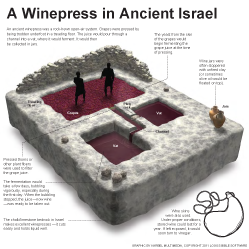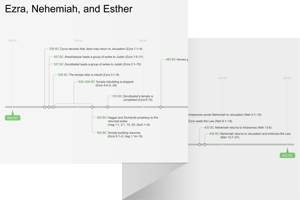5:1–13 In chs. 4 and 6, Nehemiah deals with external threats to the community in Jerusalem. Here, he is faced with an internal crisis: economic inequality. Two factors are explicitly blamed for economic hardships in Judah: famine (v. 3) and heavy taxation (v. 4). With a famine happening, demand for food undoubtedly would have inflated prices. The work of rebuilding the wall may also have contributed since people would have had less time for agriculture. There are three groups negatively affected by these hardships: those who apparently owned no land (v. 2); those who owned some land but were being forced to mortgage it (v. 3); and those who did not have the means to pay taxes (v. 4). All three groups were forced to go into debt to survive, thus putting their future in jeopardy. As governor, Nehemiah needed to strengthen the community of returned Jewish exiles by acting on behalf of the impoverished among them. The wealthier members of the community were taking advantage of the situation to enrich themselves (vv. 7–8). Nehemiah orders them to stop their unfair lending practices and restore the property they acquired unethically (vv. 9–13). |
5:1 a great cry of distress of A cry of distress. The people again fear for their lives (v. 2; compare Exod 3:9).
5:2 We must get grain The people in this group seem to have no means of obtaining grain—perhaps because they are not land holders and thus have no way of growing food on their own.
5:3 have pledged our fields In this time of famine, small landowners were being forced to give up their means of subsistence in order to get food in the short term.
vineyards One of the staples of Israel’s economy. The nation was famous for its wine—especially the area surrounding Gibeon, situated just north of Jerusalem.
famine Poor harvests were common in the postexilic period (Hag 1:5–6, 10–11; 2:15–16, 19; Mal 3:9–12).
 Famines in the Bible Table
Famines in the Bible Table
5:4 for the tax of the king Refers to a property or real estate tax. Persians used revenue from taxation to build their empire.
5:5 to be slaves In the ancient Near East, individuals sold themselves or their children into the service of a creditor to pay off debts, a practice known as debt slavery. Old Testament law stipulates that debt slaves would be released from their duties when the debt was paid off or at the seventh year (Exod 21:2; Deut 15:12). Leviticus orders the release of debt slaves at the Year of Jubilee
(Exod 21:2; Deut 15:12). Leviticus orders the release of debt slaves at the Year of Jubilee (Lev 25:39–41).
(Lev 25:39–41).
5:6 I was very angry This conflict posed a threat not only to the rebuilding project but to the unity of the community of returned exiles. Societal mistreatment originally tore the nation apart when Jeroboam led the 10 northern tribes to secede from the rule of Rehoboam (1 Kgs 12).
5:7 I quarreled This Hebrew term used here, arivoh, has legal-judicial significance. The prophets often used this term to describe Yahweh’s covenantal lawsuit against those guilty of breaking His laws (e.g., Isa 3:13; Jer 2:9; Hos 4:1; Mic 6:1).
the nobles and the prefects Nehemiah courageously opposes the selfish behavior of the strong in the community. This kind of unjust treatment of the weak was in part what led to the exile in the first place (Isa 5:8–10).
You yourselves are taking interest from your own brother Old Testament law forbade the Israelites from charging interest when making loans to fellow Jews (Exod 22:25).
5:8 have bought back our brothers the Jews Wealthy Jews made an effort to buy back many of the Jewish descendants of those originally taken into slavery by the Assyrians and Babylonians. Such efforts made the return of these slaves to Jerusalem possible.
5:10 my servants Probably men under Nehemiah’s personal authority. See note on Neh 4:16.
5:11 grain, the grape juice, and the olive oil The chief agricultural products of Israel (e.g., Deut 7:13).
the interest on the money Probably refers to the amount of interest commonly charged by the creditors. A one percent monthly interest rate equals a 12 percent annual rate.
5:13 I also shook out my garment In ancient times, people often carried their personal belongings in the folds of their clothing. These folds essentially served as pockets. Paul makes a similar gesture in Acts 18:6.
God will shake out everyone from his house Nehemiah’s symbolic act meant to show the nation that if they disobeyed God, He would shake them out just like this garment. They would have nothing of value left after Yahweh was finished judging them.
5:14–19 Here Nehemiah reveals how he lived by example and did not take advantage of the people as previous governors had done. As governor, he was entitled to compensation derived from collection of taxes for Persia (Neh 5:14). Nehemiah indicates that while previous governors took more than their rightful compensation, he did not even take his due (v. 15). He was still able to provide food for 150 people or more, despite foregoing this official allowance (vv. 17–18). |
5:14 governor This is the first indication in the text of Nehemiah’s official title.
the twentieth year Referring to 445 bc.
the thirty-second year Referring to 433 bc.
5:15 The former governors Sheshbazzar and Zerubbabel are the only known former governors of Judah (see Ezra 5:14; Hag 1:1). However, it is not likely that Nehemiah was speaking about them; there had been a gap of some years between them and Nehemiah.
and Zerubbabel are the only known former governors of Judah (see Ezra 5:14; Hag 1:1). However, it is not likely that Nehemiah was speaking about them; there had been a gap of some years between them and Nehemiah.
shekels A shekel weighed 11.4 grams. Forty shekels of silver was approximately a pound of silver.
weighed 11.4 grams. Forty shekels of silver was approximately a pound of silver.
5:17 prefects and Jews In the Persian custom, local nobles and officials routinely dined at the table of the king.
5:19 Remember This is the first of the prayers in which Nehemiah asks God to remember (Neh 6:14; 13:14, 22, 29, 31). These remembrance prayers are an allusion to the curses and blessings connected to Yahweh’s covenant with Israel (Lev 26; Deut 28). Here, the remembrance is positive: Nehemiah anticipates Yahweh’s favor because of the good he has done on behalf of Israel (Neh 13:14, 22, 31). Later in the book, the negative aspect will be revealed as Nehemiah anticipates the judgment of God on those who oppose his mission (6:14; 13:29).

|
About Faithlife Study BibleFaithlife Study Bible (FSB) is your guide to the ancient world of the Old and New Testaments, with study notes and articles that draw from a wide range of academic research. FSB helps you learn how to think about interpretation methods and issues so that you can gain a deeper understanding of the text. |
| Copyright |
Copyright 2012 Logos Bible Software. |
| Support Info | fsb |
 Loading…
Loading…


